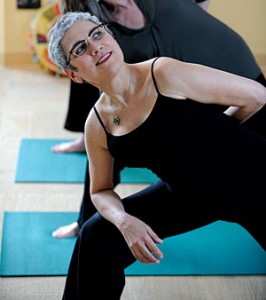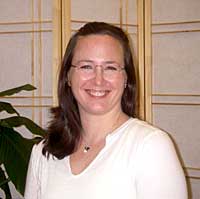Thriving After Cancer
June 22, 2011 | Melissa Marino
Breast cancer survivor Adrien MacKenzie isn’t satisfied with simply being a cancer “survivor.” She wants to be a “thriver.”

Physical therapy assistant Adrien MacKenzie wants to do more than “survive” breast cancer – she aims to “thrive.” (Photo by Joe Howell)
“It’s going to be a while before I get over that ‘I just got over chemotherapy’ look,” she acknowledges, “but I don’t want to always identify as ‘the cancer patient’ or ‘cancer survivor’ in the room.”
MacKenzie, a physical therapy assistant at Vanderbilt’s Dayani Center, is on a committee charged with developing a research project – called “Restore Wellness: Cancer Thrivership Program” – to determine how best to help cancer survivors “thrive.”
She suggested incorporating the idea of thriving into the project’s name.
“The thing about ‘thrivership’ for me, it just had a more positive connotation about moving forward with one’s life,” MacKenzie says.
The project, a collaboration between Vanderbilt’s Center for Integrative Health, Dayani Center and REACH for Survivorship Program, will offer cancer survivors a series of educational and wellness programs, and determine which ones they find most beneficial.
“The healing and recovery process for cancer survivors often involves much more than standard medical treatment,” says Debra Friedman, M.D., medical director of the REACH for Survivorship Program and director of Pediatric Hematology-Oncology at Vanderbilt. “Research like this will guide us as we continue to develop a comprehensive wellness program for cancer survivors, focused on all aspects of their healing – mind, body and spirit.”
Physical activity, getting “moving” again, is an important part of recovery.
“One of the biggest predictors of survival in general for cancer patients is the amount of sweaty exercise you get per week. And there’s a lot of evidence for that, particularly for breast cancer,” says MacKenzie.
Participants will attend a structured class on Saturdays, which will include an educational session on topics ranging from mindfulness to nutrition and a guided movement class like qigong, yoga or traditional exercise. Then, during the week, participants can freely choose to attend one of the classes offered at VCIH or Dayani.
The goal is to “give participants the structure to support their wellness, but also start to participate themselves in deciding what is best for them and what is healthy,” says Rachel Mitchell, a yoga instructor at VCIH.
Cancer survivors often have some specific needs to address, like nausea and peripheral neuropathies that can result from cancer treatments. And while many cancer survivors experience weakness and fatigue well after treatment has ended, the physical activity components of the program will be gentle enough for most participants.
“Many of our classes, especially gentle yoga, have been designed for – and our instructors have experience with understanding – what individual students in front of them are dealing with on a physical level,” says Michelle Foote Pearce, L.P.C., R.N., M.S.N., D.Min., a qigong instructor, psychotherapist and nurse at VCIH.

Rachel Mitchell
“I think this study is so exciting because it’s designed to help give people some tools to sort of begin to introspectively ask what they need for their own health and wellness moving forward, but with structure so that it doesn’t feel like jumping off a cliff,” says Mitchell.
“The mind-body integration factor of this program is going to be important for giving people the opportunity to get some professional instruction on what their limitations should be, so they don’t over-limit themselves or expect too much
of themselves,” says MacKenzie.
The combination of muscle-building, cardiovascular, and the more restful, meditative activities (such as qigong and tai chi) will “give people a better sense of their own bodies and help control some of the fear factor that goes along with being a cancer patient,” MacKenzie says.
She hopes participants will learn it is possible to not only survive, but to “thrive” after cancer.
“People who feel like it’s been beyond them to stay in shape while being a cancer patient may have a chance to discover that it’s possible to do it. Although the definition of ‘in shape’ may have to change, it really is possible to fight the cancer while you keep your body well.”
For updates on Vanderbilt’s comprehensive cancer wellness program, please visit www.vanderbiltreach.org.
